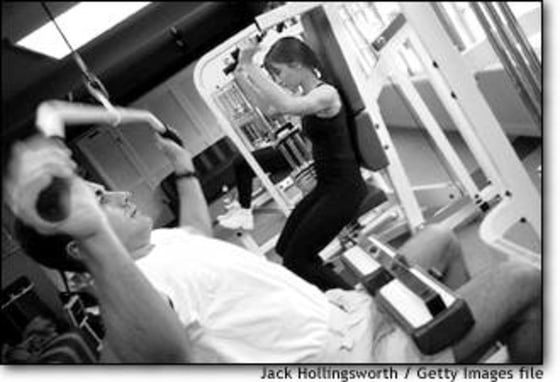How can I motivate my husband to exercise? What’s the best way to curb post-workout munchies? Smart Fitness answers your queries. Have an exercise question? Send it to smartfitness@msnbc.com. We’ll post select answers in future columns.
Question: How can I motivate my husband to exercise? No matter what I try, it doesn’t work! Please help.
Answer: Like most couch potatoes, your husband probably knows he should be working out. But he just can’t bring himself to take the plunge.
Not surprisingly, many people avoid exercise because they don’t find it even remotely appealing. And with busy schedules, physical activity becomes an even lower priority.
That’s why experts say there’s no underestimating the fun factor when it comes to staying fit. People who enjoy certain activities are simply more likely to stick with them.
“It’s very important to find something that you like doing,” says Keli Roberts, group fitness manager at the Equinox health club in Pasadena, Calif., and a spokesperson for the American Council on Exercise.
“A lot of people associate working out with the gym, and if they don’t like the gym, they don’t work out,” Roberts says.
And all the coaxing in the world probably isn’t going to get them to the gym.
“It’s like trying to eat Brussels sprouts when you don’t like Brussels sprouts,” she says.
Are you a gym rat trying to drag your unwilling husband along? Or do you speed walk around the neighborhood while he’s sitting it out in the shade because he can’t take the summer heat?
Start by finding out what activities he might enjoy. Perhaps he would love fencing with the guys at the community center. If he’s an outdoor lover, how about sea kayaking, snowshoeing or biking? Tango, anyone?
Once you’ve found an activity or two that he’s willing to try, consider joining him.
“I’m a great believer in having a workout partner,” Roberts says.
Exercising together can be a major motivator, experts say. A partner can prod you when you’re slacking off or trying to weasel your way out of a workout.
Increasingly, couples are turning to personal trainers for “partner training,” in which two people work out together with one trainer.
Doubling up can save money and also provide added incentive to stick with a fitness regimen. Trainers track results and schedule regular appointments, which may carry a cancellation fee — yet another reason to stay the course.
Partner training also can be fun and, while not exactly a night on the town, gives busy couples some one-on-one bonding time, says Sherri McMillan, vice president of Northwest Personal Training and Fitness Education, a personal training studio in Vancouver, Wash.
For the truly hard-core couch potatoes, immediate gratification — “some kind of fun event at the finish line” — may be necessary, says McMillan, also a spokesperson for IDEA, a fitness industry trade group.
A jazz festival at the park, for instance, may be just the motivation someone needs to get out for a walk. “You kind of sneak the exercise in en route to something that’s really enjoyable,” she says.
If all else fails and your husband still refuses to get moving, there’s one more bonus incentive you might tell him about: Studies have found that regular exercise can help boost a person’s sex life, and maybe even stave off sexual dysfunction.
In the end, if you can get your husband to work out long enough to start seeing some results — a flatter belly or bigger pecs, for instance — and feeling better all around, you may have him hooked. Then you can both work to keep each other’s fitness programs on track.
Post-workout munchies
Question: I’m often starving after a workout. Is that normal? What can I do to subdue the hunger and avoid over-eating?
Answer: People who are famished after exercise generally have not been properly nourished beforehand, says Lona Sandon, a personal trainer and assistant professor of clinical nutrition at the University of Texas Southwestern Medical Center at Dallas.
“It’s not just a post-workout meal they need to be concerned with but also a pre-workout meal,” says Sandon. “You should eat within three to four hours of a workout.”
While a big meal several hours ahead is fine, choose lighter snacks such as a piece of fruit and crackers or a glass of juice and some veggie sticks closer to the time of the workout, she recommends. The carbohydrates in such foods will help fuel your working muscles.
If you exercise on an empty stomach, you may not have enough energy to get through your workout. And you’ll be even more hungry afterward, when your body is crying out for carbs.
“The body is saying ‘feed me’ because I don’t have any glycogen (carbohydrate) stores to work with,” Sandon explains.
Within half an hour after exercise, she advises getting some carbohydrates along with a little protein. A few options: a slice of toast with peanut butter, a fruit smoothie with yogurt or a bowl of cereal with milk.
Most exercisers — even those working out an hour a day — probably will not need to increase their overall caloric intake because they’re only burning about 200 to 300 calories during each workout, Sandon points out.
However, long-distance runners and other athletes who train for several hours a day may indeed require more calories to keep them going. For them, nutritionists can offer dietary guidance on a case-by-case basis.
